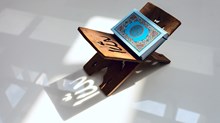
“The LORD is with me; I will not be afraid. What can mere mortals do to me?” (Psalm 118:6, NIV).
It would be easy to answer the psalmist’s rhetorical question with the steady stream of horrors I receive from daily news reports. My mind can quickly scroll through nightmare scenarios of terrible things that others could do to me or my loved ones. And beyond what mortals can do, there are illnesses, accidents, natural disasters. Life is fraught with reasons to fear.
This issue of Today’s Christian Woman unpacks one of those reasons dominating the news: the growing threat of Islamist terrorism. Reports of beheadings and suicide bombings give us plenty of reasons to fear—and, unfortunately, it’s a fear that frequently morphs into ugly prejudice. As our cover story explores, Jesus calls us to push back against fear-driven xenophobic tendencies and, instead, treat Muslims with active love.
From fear of terrorism to threats like cancer or crime, this world can be a scary place. Trusting God doesn’t mean that you or I or our loved ones will forever live in a bubble of magical protection, immune from hardship or shielded from danger.
That’s why, amid all the profound statements of trust in Scripture, my favorite comes from three young men on Babylon’s death row: Hananiah, Mishael, and Azariah. (You may know them better by their Babylonian names, Shadrach, Meshach, and Abednego.) Before their “happy ending”—when they had no idea if they’d live or die—they uttered these powerful words:
If we are thrown into the blazing furnace, the God whom we serve is able to save us. . . . But even if he doesn’t, we want to make it clear to you, Your Majesty, that we will never serve your gods or worship the gold statue you have set up. (Daniel 3:17–18, emphasis added)
They would trust God and remain faithful to him, even if it meant death by fire. Even if the miraculous rescue wouldn’t come.
This is the “even-if” trust David expressed so powerfully: “Yea, though I walk through the valley of the shadow of death, I will fear no evil: for thou art with me” (Psalm 23:4, KJV).
This “even-if” trust ultimately undergirds the rhetorical question in Psalm 118:6. The very worst that mortal man can do to us pales in comparison to the very best of God.
Can evil wound us? Yes. Can it even kill us? Indeed. But even if it does—even then—“No power in the sky above or in the earth below—indeed, nothing in all creation will ever be able to separate us from the love of God that is revealed in Christ Jesus our Lord” (Romans 8:39).
Grace,

Kelli B. Trujillo
Follow me at @kbtrujillo and @TCWomancom
Read more articles that highlight writing by Christian women at ChristianityToday.com/Women
 Read These Next
Read These Next


 Build Your Bible PowerParental Advice
Build Your Bible PowerParental Advice
 Why Do We Compare Our Stories?Getting real about our struggles (even if another’s pain seems “worse”)
Why Do We Compare Our Stories?Getting real about our struggles (even if another’s pain seems “worse”)








 Homepage
Homepage

